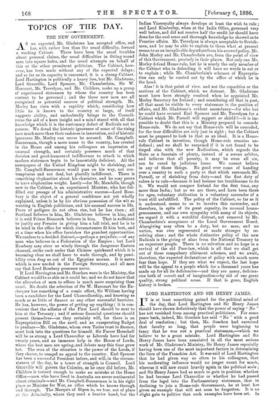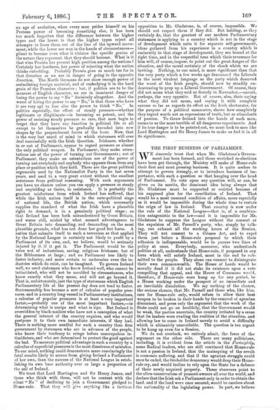LORD HARTINGTON AND Slit HENRY JAMES.
IT is at least something gained for the political mind of the day, that Lord Hartington and Sir Henry James should have shown definitively that the power of saying "No" has not vanished from among practical politicians. For some years back, indeed, Mr. Goschen has said "No" with a good deal of resolution ; but then, Mr. Goschen had exercised that faculty so long, that people were beginning to fancy that he was not a practical statesman,—which we believe to be a great mistake. Lord Hartington and Sir Henry James have been associated in all the most serious work of Mr. Gladstone's Ministry, Sir Henry James especially having been one of the most important factors in determining the lines of tile Franchise Act. It was said of Lord Hartington that he had given way so often to his colleagues, that his moderating influence would no longer count for much, whereas it will now count heavily again in the political scale ; and Sir Henry James had so much to gain in position, whether he had become Lord Chancellor or whether he had passed from the legal into the Parliamentary statesman, that in declining to join a Home-rule Government, he at least has given an example that will not soon be forgotten. It is no slight gain to politics that such examples have been set. In
an age of evolution, when every man prides himself on his Protean power of becoming something else, it has been too much forgotten that the difference between the higher types and the lower, is that the higher types reject all attempts to force them out of the line of the upward move- ment, while the lower are wax in the hands of circumstances— pliant to become even what it vitiates the specific genius of the nature they represent, that they should become. What is it that wins Prussia her present high position among the nations? Certainly her hardness, her power of rejecting what the nation thinks enfeebling. Probably Prussia goes as much too far in that direction as we are in danger of going in the opposite direction. The North Germans do not show enough power of assimilating foreign material, and of embodying it in the hard grain of the Prussian character ; but, if politics are to be the measure of English character, we are in imminent danger of losing the power to say " No " decisively altogether. And the worst of losing the power to say "No," is that those who have it are very apt to lose also the power to think "No." In politics especially, the effect of steady pressure—whether legitimate or illegitimate—is becoming so potent, and the power of resisting steady pressure so rare, that men begin to forget that they have any function in political life at all except to let themselves be gradually kneaded into new shapes by the preponderant forces of the hour. Now, that is the very last mood of mind in which statesmen will ever deal successfully with the Irish Question. Irishmen, whether in or out of Parliament, alipear to regard pressure as almost the only political weapon. In Parliament, they make osten- tatious use of the power of turning out Governments ; out of Parliament, they make an ostentatious use of the power of turning out everybody and anybody who opposes them from any place or position which they hold. These are the great political arguments used by the Nationalist Party in the last seven years, and used to a very great extent without the smallest assistance from political reasoning. With such arguments you have no chance unless you can apply a pressure as steady and unyielding as theirs, in resistance. It is probably the greatest misfortune from which Ireland has Buffered, that while the Irish nation itself is in the ante-political stage of national life, the British nation, which necessarily supplies the standard of what the Irish have a plausible right to demand, is in a genuinely political stage ; so that Ireland has been both misunderstood by Great Britain, and worse still, misled by what seemed advantageous to Great Britain into demanding, and demanding on the most plausible grounds, what has not done her good but harm. A nation that submits itself to such a terrorism as that applied by the National League is certainly not likely to profit by a Parliament of its own, and, we believe, would be seriously injured by it. if it got it. The Parliament would be the voice not of industrious, saving, religious Irishmen, but of the Ribbonmen at large ; and no Parliament less likely to foster industry, and more certain to undermine even the in- dustries which do exist, can be imagined. To govern Ireland well, we need statesmen who knew Ireland well, who cannot be intimidated, who will not be moulded by circumstances, who know exactly what they mean, and will not go beyond it. That is, unfortunately, just the type of statesman which English Parliamentary life at the present day does not tend to foster. Statesmanship has become a sort of calculus of popular pres- sures, and in a country long versed in Parliamentary institutions, a calculus of popular pressures is at least a very important factor,—probably one of the most important factors,—in determining what is unripe and what is ripe. But Ireland is overridden by black-mailers who have not a conception of what the general interest of the country requires, and who would postpone it to their own immediate interests, if they had. There is nothing more needful for such a country than firm government by statesmen who are in advance of the people, who know their tendency to cringe before unscrupulous in- timidators, and who are determined to protect the good against the bad. To measure political advantage in such a country by a calculus of superficial pressures is the most disastrous of mistakes. To our mind, nothing could demonstrate more convincingly the fatal results likely to accrue from giving Ireland a Parliament of her own, than the success of the National League in estab- lishing its own base authority over so large a proportion of the soil of Ireland.
We trust that Lord Hartington and Sir Henry James, and those who think with them, will not be content with the silent " No " of declining to join a Government pledged to Home-rule. That they will give anything like a factious opposition to Mr. Gladstone, is, of course, impossible. We should not respect them if they did. But holding, as they certainly do, that the greatest of our modern Parliamentary statesmen is applying to a country which is not in the stage of development which suits it for separate self-government, ideas gathered from his experience in a country which is eminently in that stage of development, they are bound at the right time, and in the respectful tone which their reverence for him will, of course, impose, to point out the great danger of the situation, and the moral certainty of the shock which we are inviting. Nothing, to our mind, is more significant than that the very party which a few weeks ago denounced the Liberals in the most virulent language as the party which deserved the worst of the Irish people, should now be steadily en- deavouring to prop up a Liberal Government. Of course, they did not mean what they said so fiercely in November,—meant, perhaps, the very opposite. But of course, also, their saying what they did not mean, and saying it with complete success so far as regards its effect on the Irish electorates, for- the purpose of a political manceuvre, shows how completely they regard words not as expressions of truth, but as stimulants of passion. To throw Ireland into the hands of such men, seems to us the most terrible of all dangerous experiments. And if its true danger is to be pointed out, we must look to men like Lord Hartington and Sir Henry James to make us feel it in all its significance.















































 Previous page
Previous page